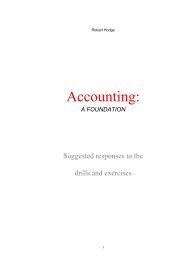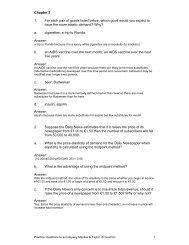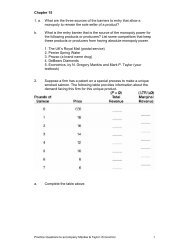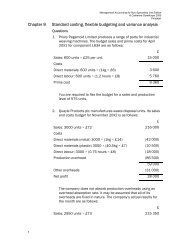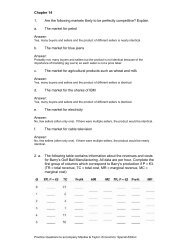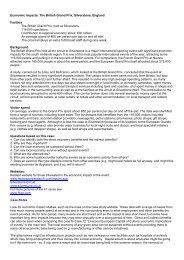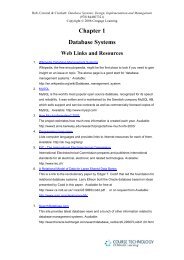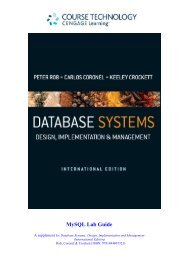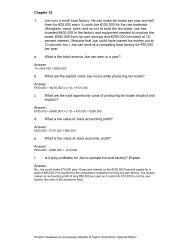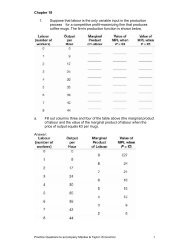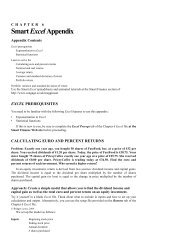CHAPTER Recruiting and selecting staff for international assignments
CHAPTER Recruiting and selecting staff for international assignments
CHAPTER Recruiting and selecting staff for international assignments
- No tags were found...
You also want an ePaper? Increase the reach of your titles
YUMPU automatically turns print PDFs into web optimized ePapers that Google loves.
31017_05_Ch05_p109-136.qxd 9/7/07 12:15 PM Page 124124 <strong>CHAPTER</strong> 5 RECRUITING AND SELECTING STAFFThere are signs that in a post 9/11 world, the USA is beginning to refocus on someof these issues. Recently, the Committee on Education <strong>and</strong> the Work<strong>for</strong>ce of the USCongress 47 has examined the issue of <strong>international</strong> <strong>and</strong> <strong>for</strong>eign language studies<strong>and</strong> the Chair of the Committee noted that:Congress created Title VI in the National Defense Education Act of 1958 toaddress a sense of crisis caused by U.S. citizens’ lack of knowledge of othercountries <strong>and</strong> cultures. This program remains the federal government’sleading mechanism <strong>for</strong> supporting programs that produce Americans withexpertise in <strong>for</strong>eign languages <strong>and</strong> <strong>international</strong> studies, including<strong>international</strong> business . . . Continued federal support <strong>for</strong> these programsreflects the significance <strong>and</strong> growing relevance of language <strong>and</strong> area studies,diplomacy, national security, <strong>and</strong> business competitiveness.This level of commitment is encouraging, but as we noted in Chapter 1, the task of<strong>international</strong>izing business education in the USA is a large one <strong>and</strong> will requireconsiderable resources <strong>and</strong> persistence <strong>for</strong> significant progress to be made.Another component to language as a situation factor in the selection decision isthe role of the common corporate language. As previously discussed, many multinationalsadopt a common corporate language as a way of st<strong>and</strong>ardizing reportingsystems <strong>and</strong> procedures. This is not, perhaps, an issue <strong>for</strong> PCN selection withinmultinationals from the Anglo-Saxon world (Britain, the USA, Canada, Australia<strong>and</strong> New Zeal<strong>and</strong>) where the chosen corporate language remains the same as thatof the home country. However, it becomes an expatriate selection issue <strong>for</strong> multinationalsfrom non-English-speaking countries that adopt English as the corporatelanguage, unless the posting is to a country with a shared language. For instance,a Spanish multinational, using Spanish as the corporate language, <strong>selecting</strong> a PCNto head its new subsidiary in Mexico, does not face the same language issue as aSpanish multinational, with English as its corporate language, <strong>selecting</strong> a PCN toits US facility. For the latter, fluency in English would be required. Lack of fluencyin the corporate language, there<strong>for</strong>e, can be a selection barrier. Prospective c<strong>and</strong>idatesmay be eliminated from the potential pool due to a lack of at least competencyin the common language. 48 Language ability there<strong>for</strong>e may limit the MNE’sability to select the most appropriate c<strong>and</strong>idate.The use of selection testsAlthough there is a consensus among scholars <strong>and</strong> practitioners that personalcharacteristics (or traits) are important, there is considerable debate about howsuch personal characteristics can be reliably <strong>and</strong> accurately measured. Personality<strong>and</strong> psychological tests have been used in the selection process, but the effectivenessof such tests as predictors of cultural adjustment is questioned. For example,Torbiörn 49 comments that though desirable personality traits are specified <strong>and</strong> recommended,the tests or criteria to assess these traits are seldom convincingly validated.Likewise, Willis 50 states that if tests are used they should be selected withcare <strong>and</strong> regard <strong>for</strong> reliability <strong>and</strong> validity because, while some tests may be usefulin suggesting potential problems, there appears to be little correlation betweentest scores <strong>and</strong> per<strong>for</strong>mance. He further adds that most of the relevant tests havebeen devised in the USA <strong>and</strong>, there<strong>for</strong>e, may be culture-bound. Use of such testswithout careful modification on non-American nationals adds another questionmark to their reliability <strong>and</strong> validity as predictors of expatriate success. It is importantthat HRM <strong>staff</strong> in all locations are aware of the debate surrounding the use of



